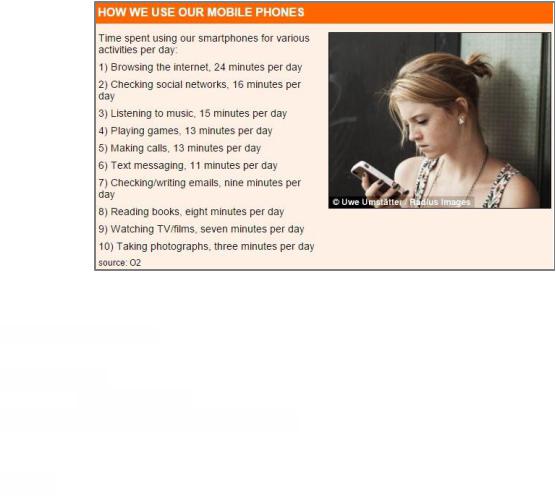
Simple english for security specialists and bachelors additional exercises for self-study training
..pdf
5 Readand translatethearticleonusingmobilephones.
We now spend more time looking at our PHONE than with our partner
We now spend more time on our smartphones than with our partner, according to a new study. The average smartphone user tends to spend two hours (119 minutes) a day using their gadget. Yet, the amount of time we spend with our other halves per day is just 97 minutes – a third less – on average.
The study by mobile phone provider O2 looked at exactly what we use our phones for and how much time each activity takes each day. Brits now spend 24 minutes every day browsing the internet – longer than anything else. Next comes checking various social networks (16 mins), then listening to music (15 mins) and playing games (13 mins). Surprisingly, using our smartphone to make calls (13 mins) and send texts (11 mins) are the fifth and sixth most used functions on our mobiles.
What’s more, the research shows we are replacing many household objects as our smartphones do the same job. 57 per cent of us admit we have no use for an alarm clock anymore. Half of us no longer wear a watch as we rely on our mobile to tell the time, and 46 per cent use only their phone to take photographs. More bold moves include ditching a laptop in favour of using a smartphone (25 per cent) and discarding a games console for a handset (12 per cent). The 'Mobile Life' report, which was carried by O2 and electronics company Samsung, involved 2,000 adults.
Adapted and abridged from http://www.dailymail.co.uk/sciencetech/
Notes
other half (pl halves) – разг. (вторая) половина (жена или муж)
Brits – разг. британцы
what’s more – к тому же; более того bold move – смелыйшаг
ditch – разг. бросать, отделываться от infavourof – ради кого-либо/чего-либо was carried – былсделан (by – кем-либо) involve – вовлекать, включать
21

6 In the text, find the English equivalents of the following words.
1 |
(новое) приспособление, устройство |
g _ _ _ _ _ |
2 |
кроме того, к тому же |
y _ _ |
3 |
количество (с неисчисл. сущ.) |
a _ _ _ _ _ |
4 |
в точности; точно |
e _ _ _ _ _ _ |
5 |
удивительно |
s _ _ _ _ _ _ _ _ _ _ _ |
6 |
самый |
m _ _ _ |
7 |
домашний, бытовой |
h _ _ _ _ _ _ _ _ |
8 |
так как |
a _ |
9 |
допускать, соглашаться; признавать |
a _ _ _ _ |
10 |
полагаться, надеяться на |
r _ _ _ _ _ |
11 |
избавляться, отказываться от |
d _ _ _ _ _ _ |
12 |
телефонная трубка |
h _ _ _ _ _ _ |
13 |
взрослый |
a _ _ _ _ |
7 Complete the sentences below with prepositions.
1We now spend more time ____ our smartphones than ____ our partner, according
____ a new study.
2The amount ____ time we spend ____ our other halves ____ day is just 97 minutes ____ average.
3The study ____ mobile phone provider O2 looked ____ exactly what we use our phones ____.
4Next comes checking various social networks (16 mins), then listening ____
music (15 mins) and playing games (13 mins).
5Using our smartphone to make calls (13 mins) and send texts (11 mins) are the fifth and sixth most used functions ____ our mobiles.
657 per cent ____ us admit we have no use ____ an alarm clock anymore.
7Half ____ us no longer wear a watch as we rely ____ our mobile to tell the time.
8More bold moves include ditching a laptop ____ favour ____ using a smartphone (25 per cent) and discarding a games console ____ a handset (12 per cent).
8 Are the statements TRUE or FALSE? Correct the false statements.
1According to the research by mobile phone provider O2, British people spend more time on their smartphones than with their partner.
2The British do not browse the Internet on their phones.
3The average smartphone user spends fourhours a day using their gadget.
4The most used functions on the mobiles are making calls and sending texts.
5British people checkvarious social networks only on their home computers.
6Half of the British wear a watch as they do not rely on their mobileto tell the time.
746 per cent of the British use only their phone to take photographs.
8The report by O2 and Samsung involved 2,000 teenagers.
22
GRAMMAR 3A
9 Choose the correct variant.
1You remember / remembers her address.
2He take / takes English lessons.
3I see / sees what you mean.
4They want / wants to watch this film.
5It get / gets dark very early in winter.
6We try / tries to study English very hard.
7She write / writes to her mother every week.
10 Open the brackets.
1The sun (rise) in the East.
2Tony (read) newspapers in the evening.
3My parents (want) to buy new furniture.
4At the concert you (play) the violin.
5My little sister (go) to school every day.
6I (want) to have my own room in the hostel.
7My mother and I (cook) a delicious pie every Sunday.
11 Write the sentences in the singular.
1The girls remember everything.
2They believe the story.
3Housewives work very much at home.
4My friends want to study French.
5His cousins work in New York.
6The boys wake up at seven.
7Housewives have to work very hard.
8Children spend a lot of time out-of-doors.
9On Saturday they go to the cinema.
10Students go to the library twice a day.
11Children receive a lot of pleasure from this game.
12They go to work bybus and they return home on foot.
23
3B
12 Choose the correct variant.
A
1You don’t / doesn’t remember new words.
2She don’t / doesn’t have any mistakes in her translation.
3I don’t / doesn’t want to serve in the army.
4He don’t / doesn’t come to see us on Monday.
5We don’t / doesn’t have bad students in our English group.
6It don’t / doesn’t take you long to get to the university.
7They don’t / doesn’t have a lot of relatives in New York.
B
1Do / Does she remember everything?
2Do / Does he study German?
3Do / Does I have a good mark?
4Do / Does we have 4 classes today?
5Do / Does they speak English at the lessons?
6Do / Does it rain a lot in autumn?
7Do / Does you have a lot of English books at homes?
13 Open the brackets.
A
1The last train (don’t / doesn’t) leave at midnight.
2Our lessons (don’t / doesn’t)begin at half past eight.
3I (don’t / doesn’t) read newspapers and magazines every day.
4The girl (don’t / doesn’t) play the piano very well.
5You (don’t / doesn’t) work very hard.
6Benny (don’t / doesn’t) knock at the door every morning.
7My cousin and I (don’t / doesn’t) see each other.
B
1(Do / Does) your fellow student working at night?
2(Do / Does) you remember all the new words?
3(Do / Does) your grandmother live in the country?
4(Do / Does) little children sleep twice a day?
5(Do / Does) Alex have a lot of friends to play with?
6(Do / Does) I have a chance to catch up with other students?
7(Do / Does) students have lunch at 12.30?
24
3C
14 Add -ing to the following verbs.
agive, take, begin, pay, say
blisten, write, stay, leave, go
ccome, dine, put, pass, talk
dwork, get, sit, look, forget
ehurry, study, travel, have, give
ftaste, prefer, bring, offer, add
15 Write the sentences in the negative and interrogative; give two short answers.
Example: She is translating an English article. – She is not translating an English article.
Is she translating an English article? – Yes, she is. No, she isn’t.
1I am working hard at my English.
2Tom is reading a newspaper.
3Mike and I are working at the laboratory.
4I am preparing my homework.
5Kate is sitting at the window.
6The boys are going to university.
7I am writing letters to my cousins.
8Mr. Smith is giving a lesson.
9Abigail and Susan are coming home.
10I am having breakfast with my family.
11Pam is looking at the sea.
12The girls are eating in the dining-room.
16 Open the brackets. Use the Present Continuous tense.
1I (wash) my hair.
2Timothy (feed) his dog.
3Mr. Jones (clean) his yard.
4Nancy (paint) her kitchen.
5Our neighbours (wash) their car.
6I (do) my homework.
7The boys (run) in the garden.
8The children (brush) their teeth.
9He (fix) his bicycle.
10They (have) a big dinner together.
11John and his friends (go)to the library.
12Ann (sit) at her desk.
25
3D
17 Make the sentences negative and interrogative.
1Tony takes English lessons.
2My friends go to the laboratory every week.
3Kate is reading newspapers now.
4Students are still working in the library.
18 Choose the right variant.
1It often rains / is raining in autumn.
2Do not go out, it rains / is raining heavily.
3They still discuss / are still discussing where to go now.
4My elder sister has / is having a music lesson. She always has / is having a music lesson on Friday.
5Father reads / is reading a newspaper. He usually reads / is reading something before going to bed.
6Mother cooks / is cooking breakfast in the kitchen. She always cooks / is cooking in the morning.
7I often meet / am meeting you at the corner of this street. Do you wait / Are you waiting for anybody?
8Do you understand / Are you understanding the use of the Present Simple?
9Do you usually go / Are you usually going through the park? – Not usually, it is only today that I go / am going here.
10Do you hear / Are you hearing anything? – Yes, somebody knocks / is knocking at the door.
11Why do you smile / are you smiling, Kitty?
12What do you write / are you writing? Do you make / Are you making notes about the two present tenses?
19 Open the brackets.
1Look, snow still (to fall).
2It often (to rain) in October.
3The sun (to set) late in summer.
4Switch on the light. It (to get) dark.
5Some people (to do) everything with their left hand.
6You can’t have the book now because my brother (to read) it.
7I always (to buy) lottery tickets but I seldom (to win).
8You (to understand) the rule?
9I (not to know) what he (to want).
10Cuckoos (not to build) nests. They (to use) the nests of other birds.
26
